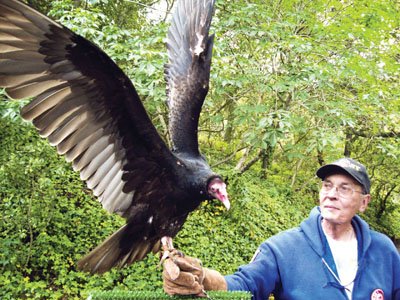Dear Mr. Roadkill: While commuting to my job, whether I’m
driving on the highway or cycling along paths, I sometimes observe
dead wildlife. I know that recent government budget constraints
means that Caltrans isn’t able to remove all the carcasses. Is
there another solution?
Q:
Dear Mr. Roadkill: While commuting to my job, whether I’m driving on the highway or cycling along paths, I sometimes observe dead wildlife. I know that recent government budget constraints means that Caltrans isn’t able to remove all the carcasses. Is there another solution? By the way, I’m also having a problem with ground squirrels that lose the “chicken-game” with my car, and whose relatives then wreak revenge on my lawn. Is there an inexpensive method of controlling these rodents without poisons?
A:
This is a job for the Road Kill Klean-Up Krew and the Pest Predators Posse. Sue-the-Wildlife-Lady says we have a locally-grown, organic and non-toxic method of environmental clean-up available at no cost to the taxpayers.
Though urban encroachment means that more animals become victims of vehicle collisions, it also means that other wildlife have found the results to be a handy source of food. This diet provides corollary benefits to our human environment, helping to rid the landscape of stinking, decomposing flesh and other unsavory (to us) debris before we happen upon it while driving or on a pleasant hike in the woods on a warm day. It’s a win-win scenario.
Road Kill Klean-Up Krew
Turkey vultures are the primo members of the Krew, disposing of the rotting remnants of roadkill (aka carrion, aka decaying dead animals). What is utterly disgusting to humans, looks and smells like gourmet food to these splendid birds. Turkey vultures have developed a marvelous physique and behavior suitable to their dietary habits – their bare head and legs prevent icky material from accumulating on feathers and their “heraldic pose” (wings outstretched while perching) allows the sun to kill bacteria on their body.
Another misunderstood – but highly beneficial natural sanitation engineer – is the opossum, an omnivore that just loves to eat pesky garden snails, fallen fruit and road-kill, too. With the turkey vulture doing the daytime tasks and the opossum taking the night shift, together they provide an outstanding, round-the-clock cleanup job.
The tendency of these critters to eat the selection of “foods” along the side of the road unfortunately means that sometimes they become road-kill or are injured by vehicles themselves. Such is the case of turkey vultures (including Zorro), owls (including Oscar), hawks (including Wapeka) and many opossums that have been cared for at WERC through the years.
Pest Predators Posse
Though members of the Posse will sometimes dine on road kill, their main diet consists of garden-and-field scourges such as ground squirrels, rats, mice and gophers. In local skies, red-tailed hawks are the most common daytime predator of the varmints. And for those rodents that thought they were lucky enough to escape the hawks during the day … a multitude of night owls (barn, great horned and screech) are on the prowl.
And they’re not safe underground either – gopher snakes and king snakes can slither way back into the far reaches of those gopher and ground squirrel tunnels, proving themselves a benefit that should be appreciated even by ophidiophobic gardeners who despair at the damage the rodents can do to carefully tended lawns.
Some of the other local creatures, in the air and on the ground, that belong to the Posse and Krew are crows, magpies and golden eagles, skunks, raccoons, badgers, weasels, foxes, coyotes and bobcats. An offshoot of the Pest Predator Posse is the Insect SWAT Team (some of whom are insects themselves), including bats, swallows, ladybugs, dragonflies and assorted amphibians. Let them do their “job.” Avoid using poisons to control the pests around your home and yard. By not using poisons, you won’t be causing excruciating pain, not only to so-called vermin, but to the animals that may eat the poisoned rodents, suffering a horrible death themselves, and possibly causing third-hand death to those animals that eat their carrion.
***
Live Chat: Come to Morgan Hill Earth Day from 10 a.m. to 4 p.m. Saturday, April 23 at the Granary, 17500 Depot St., Morgan Hill, to chat with WERC’s volunteers and meet WERC’s educational representatives of South County’s Road Kill Klean-Up Krew and Pest Predator Posse.
In keeping with the event’s environmental theme, WERC will demonstrate how some wild animals have joined the recycling movement. There will be a display of bird nests built with bits of human flotsam like pieces of string, clothes dryer lint and wire, as well as natural castoffs like moss, twigs, feathers and mud. Clarabelle, WERC’s acorn woodpecker, will be on hand to demonstrate her skill in acorn recycling.














